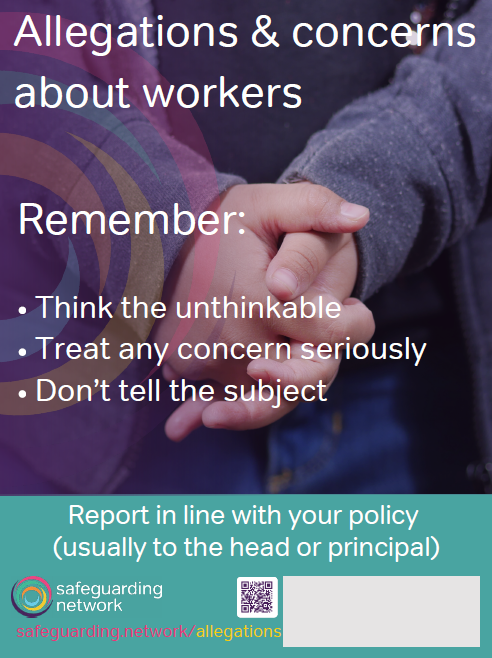Introduction
Abuse can occur in any organisation where people are in a position of trust and influence over those under 18 years old. Everyone within these organisations needs to know how to act to keep children and young people safe.
A study by the University of Greenwich on the retrospective sexual misconduct and harassment of students by teachers in secondary schools in Ireland and the UK found:
- 85% experienced sexual harassment;
- 21% experienced unwanted sexual attention;
- 14% experienced at least one form of online sexual harassment;
- few students reported the incidents to the school, and for those that did, no action was taken.
Keeping Children Safe in Education says it’s critical that settings create a culture in which all concerns about people working with children are shared responsibly with the right person, recorded and dealt with appropriately.
An open and transparent culture should:
- enable organisations to identify inappropriate, problematic or concerning behaviour early;
- minimise the risk of abuse;
- ensure that people working in, or on behalf of, the organisation understand their professional boundaries, act within those boundaries, and in accordance with the ethos and values of the institution.
Be prepared to think the unthinkable.
Need more?
Thank you for visiting our resources pages. These are free to everyone as is our fortnightly safeguarding bulletin – general safeguarding information is too important to restrict. Become a member to access lots more, including training materials for you to deliver in-house on each topic in Keeping Children Safe in Education.
Sign up for FREE fortnightly bulletin.
What about training?
We can deliver training for your setting on this and other subjects via online platforms, or face-to-face in certain areas. Just get in touch to discuss your requirements.
Definition
"Abuse of someone under 18 years old by a person that works with them. The perpetrator may be a member of staff, a volunteer, work directly with children and young people or work in a support role."
Adapted from the CSA Centre (2023)
The duty of care
When children are in your care you have a duty to keep them safe from harm and abuse.
Every organisation working with children and young people should create a safe environment. This is not just early years, education settings and social care settings, but also community groups, hospitals, sports clubs and religious groups, etc.
Everyone working in regulated activity should be vetted using safer recruitment processes (for education settings see Part 3 in Keeping Children Safe in Education), including checks by the Disclosure and Barring Service (DBS).
No matter how unthinkable, keeping children and young people safe from harm includes protecting them from potential abuse by your colleagues. Everyone undertaking regulated activity should be trained in child protection, be able to spot the signs of harm and abuse and know the appropriate action to take.
Levels of concerns and allegations
All concerns against any person working with children should be dealt with following the organisation’s policies and procedures. (Working together to safeguard children.)
The harm threshold for all organisations are concerns/allegations that might indicate a person will pose a risk of harm if they continue to work with children, where it is alleged that someone working with under-18s has:
- behaved in a way that has harmed a child, or may have harmed a child;
- possibly committed a criminal offence against or related to a child;
- behaved towards a child or children in a way that indicates they may pose a risk of harm to children;
- behaved or may have behaved in a way that indicates they may not be suitable to work with children.
For education settings, there is also guidance around concerns/allegations that do not meet the harm threshold – referred to as ‘low-level concerns’. (See Part 4 of Keeping Children Safe in Education.)
A low-level concern is any concern – no matter how small, and even if no more than causing a sense of unease or a ‘nagging doubt’ – that a person working with under-18s may have acted in a way that:
- is inconsistent with the staff code of conduct, including inappropriate conduct outside of work;
- does not meet the harm threshold or is otherwise not serious enough to consider a referral to the LADO.
Examples of such behaviour could include, but are not limited to:
- being over-friendly with children;
- having favourites;
- taking photographs of children on their mobile phone, contrary to a setting’s policy;
- engaging with a child on a one-to-one basis in a secluded area or behind a closed door;
- humiliating children.
Spot the signs
- An unusual amount of one-to-one time in secluded areas.
- Meeting with children behind closed doors.
- A child or young person repeatedly seeking a particular adult or trying hard to avoid them.
- Under/overgenerous marking of work.
- Under/overuse of praise.
- Providing extra support/giving gifts.
- Shaming/demeaning children.
- Using inappropriate language or discussing inappropriate topics.
- Being “friends” with children or young people on social media.
- Inappropriate communication with children, e.g., via personal devices.
Grooming behaviours
Grooming doesn’t only focus on children and young people, but also involves the grooming of the victim’s families and the perpetrator’s colleagues to secure access and prevent detection.
William Vahey, a prolific sex offender, was able to obtain employment at a school in London. The Serious Case Review following the discovery of the abuse that he had perpetrated at the school found that whilst there were aspects of his behaviour that should have alerted senior staff, these were never looked into.
The review found that Vahey not only groomed children but groomed the staff as well, assuming a great deal of power and influence in the school. Therefore, even though individuals had concerns these were never taken further – despite the review finding some pupils referred to him as ‘paedo Vahey’. Ian Huntley, a perpetrator of domestic abuse, sex offender and murderer, also groomed staff at the school where he worked as a caretaker.
Perpetrators may aim to present as caring, hardworking staff and will employ tactics to gain power and one-to-one access to children within or outside the organisation.
Remember, settings such as schools, early years, colleges and care homes provide a regular point of contact with children and young people. Perpetrators can befriend victims with ease. The child’s trust can override the child’s ability to see through deception. The Jeremy Forrest case demonstrates this risk. He groomed his pupil to begin what she believed was a genuine romantic relationship, and easily encouraged her to run away with him. Concerns were also raised about the school’s culture where staff “repeatedly failed to see the evidence of [the teacher’s] misconduct or to hear the concerns raised by students.“
Age of consent
It’s a criminal offence to have a sexual relationship with a child under the age of 16. It’s also an offence for an adult to have a sexual relationship with a young person under the age of 18 if the adult is in a ‘position of trust’. This applies when the young person is under 18 but over the age of consent. (The Sexual Offences (Amendment) Act, 2000)
What to do
To reduce the risks, settings should:
- Ensure safer recruiting processes and practice are in place. Those who abuse children will seek employment with access to children.
- Ensure all staff receive appropriate safeguarding and child protection training (such as signs of abuse and online safety which, amongst other things, includes an understanding of the expectations, applicable roles and responsibilities in relation to filtering and monitoring) at induction. The training should be regularly updated. In addition, all staff should receive safeguarding and child protection (including online safety) updates (for example, via email, e-bulletins, and staff meetings), as required, and at least annually, to continue to provide them with relevant skills and knowledge to safeguard children effectively and know what to do if they or someone else is worried about a child and/or a colleague.
- Ensure relevant senior leaders and governors are trained in managing allegations/concerns about workers.
- Create a child protection policy that includes procedures to be followed if a person working with children is suspected/accused of harming a child and procedures for dealing with low-level concerns.
- Educate children and young people about how to protect themselves so they can recognise and report issues such as:
- unacceptable adult behaviours;
- emotional abuse;
- inappropriate relationships and/or physical contact.
- Provide opportunities for children and young people to discuss their concerns.
- Empower everyone to embrace their child protection responsibilities.
- Provide staff, volunteers and children with the necessary tools for reporting abuse.
- Designated safeguarding leads, heads, and directors, etc., should know how to deal with low-level concerns and know how to refer concerns regarding their colleagues that meet the harm threshold to the LADO.
Culture of vigilance
Promote an open culture, in which staff may raise concerns without fear of reprisal. Ensure everyone feels comfortable to openly discuss safeguarding issues within (and, where appropriate, outside) the workplace, including online safety. Create a culture where any concern can be raised, and everyone knows it will be taken seriously and investigated.
The culture of vigilance extends to out-of-school clubs and activities held at your setting run by an external provider. Governance bodies should ensure that the provider is compliant with the requirements of Keeping children safe in out-of-school settings, and that the leasing/transfer of control agreements reflect this.
Your managing allegations policy and procedures should include that allegations relating to an incident that happened when an individual/organisation was using your premises to run activities for children should be dealt with according to your setting’s procedures, including informing the LADO.
If you have concerns
If you have concerns about a colleague, they should be referred to the headteacher or principal in an education setting or to the manager/owner/designated person in other organisations.
In education settings, if there are concerns about the headteacher or principal, this should be referred to the chair of governors, chair of the management committee, trustees or the proprietor of an independent setting as appropriate.
If allegations of abuse are made against the headteacher or principal, where the headteacher is also the sole proprietor of an independent school, allegations should be reported directly to the LADO.
Take action
- Raise any concerns with the designated person, headteacher or principal, manager, etc., as appropriate.
- Follow your managing allegations procedures.
- If necessary, refer directly to the LADO and, if a crime has been allegedly committed, the police.
- Keep taking action until you know children and young people are safe.
Independent Investigations
Independent investigations
Keeping Children Safe in Education says that, “where there is a lack of appropriate resource within the school or college, or the nature or complexity of the allegation requires it, the allegation will require an independent investigator”.
Safeguarding Network can help by sourcing a qualified, insured, DBS checked and experienced investigator. Your setting will receive detailed advice on how to proceed, support at meetings and a detailed report with clear recommendations for your governing body. Contact us for further information.
FREE allegations poster
This downloadable resource raises the profile of safeguarding for your staff team. For use in staff rooms, on safeguarding boards or on the back of toilet doors, the poster includes tips, a space for local contact details, plus a link and QR codes to this resource page. Download the poster from the resources below.
DSL Training Materials
-

Abuse by people Working with Children - Presentation
-

Abuse by People Working with Children - Presenter Notes
-

Abuse by People Working with Children - Handout
-

Abuse by People Working with Children - Quiz
-

Abuse by People Working with Children - Quiz (Answers)
-

Abuse by People Working with Children Scenario - Early Years
-

Abuse by People Working with Children Scenario - Early Years DSL Information
-

Abuse by People Working with Children Scenario - Primary
-

Abuse by People Working with Children Scenario - Primary DSL Information
-

Abuse by People Working with Children Scenario - Secondary
-

Abuse by People Working with Children Scenario - Secondary DSL Information
-

Abuse by People working with Children Scenario - FE
-

Abuse by People Working with Children Scenario - FE DSL Information
-

Abuse by People Working with Children Scenario - SEND
-

Abuse by People Working with Children Scenario - SEND DSL Information
-

Abuse by People Working with Children Scenario - Care
-

Abuse by People Working with Children Scenario - Care DSL Information
Resources
-

Allegations poster
-

Developing and implementing a low-level concerns policy
-

Better Hiring Toolkit
-

Child sex abuse in institutional contexts
-

Safer working practice for professionals in education settings
-

Safer Working Practices
Save time and improve your safeguarding approach…
Bite-size training materials to share with your staff every month.
Support to explore and develop your safeguarding culture.
A huge array of resources and professional experience at your fingertips.
Get in touch now for a personal tour of the site and details of membership benefits.
We look forward to working with you.


